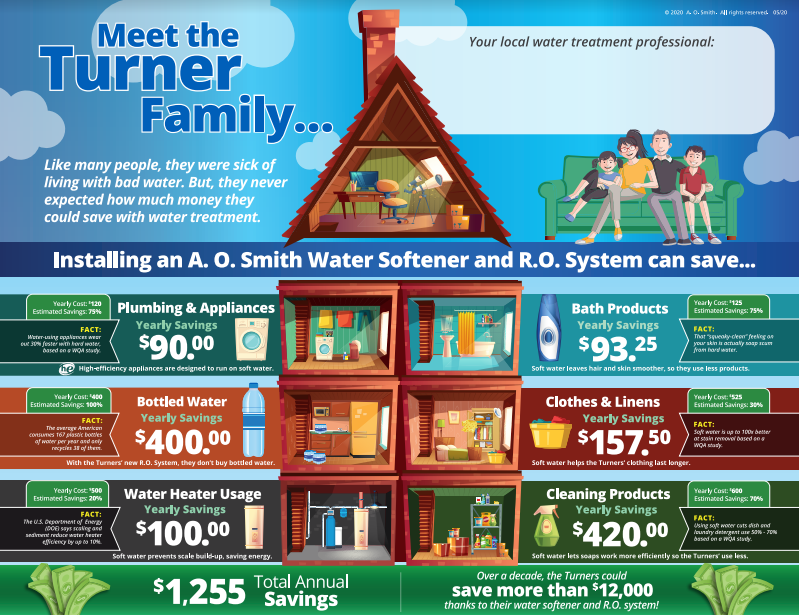Welcome to the second part of our series on tackling hard water issues. In our previous post, we examined the challenges of hard water in homes, highlighting its impact on appliances, plumbing, and health. This blog post focuses on the remedy.
If you’re experiencing hard water issues or simply want to enhance your home’s water quality, understanding how these softening systems work is essential. Reliable Services is here to guide you through making an informed decision for a healthier, more efficient home.
The Solution – Water Softening
Softening solutions for hard water work by replacing minerals like calcium and magnesium with softer minerals, typically sodium or potassium. The result? Water that’s kinder to your skin, clothes, and appliances.
The benefits are extensive. By installing a water-softening system, homeowners can enjoy:
- Longer-lasting appliances: Hard water can shorten the life of your household appliances. Soft water reduces wear and tear, ensuring your investments last longer.
- Reduced cleaning time and costs: Say goodbye to hard water stains and buildup, making cleaning a breeze and lessening the need for harsh chemicals.
- Improved water heating efficiency: Soft water heats faster than hard water, saving energy and reducing utility bills.
Types of Water-Softening Systems
When it comes to combating hard water in your home, numerous solutions are available. Understanding the different types of water-softening systems is crucial to selecting the one that best fits your needs. Here’s a brief overview of the most common ones:
- Salt-Based Ion Exchange Softeners: These traditional water softeners are the go-to choice for many homeowners. They are low-maintenance, requiring only periodic salt replenishment, and effectively replace hard water minerals.
- Dual-Tank Softeners: For households with high water demand, dual-tank softeners are an excellent option. They offer a continuous supply of soft water, even during regeneration cycles, making them suitable for large families or homes with significant water usage.
- Magnetic and Electronic Softeners: These modern systems use magnetic or electronic fields to modify hard water minerals, helping reduce scale buildup. They’re an innovative choice for those seeking an alternative to traditional methods.
Reliable Services is dedicated to providing a range of softening solutions for hard water specifically designed to meet the diverse needs of your household. Our team is here to assist you in choosing the most effective and efficient option, ensuring your home benefits from superior water quality.
Benefits of Professional Installation
Choosing professional installation over a DIY approach offers numerous benefits that ensure efficiency, longevity, and peace of mind. Here are the key advantages:
- Expertise and Experience: Professional technicians have the necessary skills and experience to install various types of water softeners properly, ensuring optimal functionality.
- Correct Sizing and Configuration: Professionals can accurately assess your home’s water usage and hardness levels to recommend the most suitable system size and type, avoiding under- or over-capacity issues.
- Warranty and Support: Many manufacturers offer extended warranties and support services when their systems are professionally installed, providing added security and assistance when needed.
- Compliance with Regulations: Professionals know local building codes and environmental regulations, ensuring your system complies with all legal requirements.
- Reduces Time and Hassle: A professional installation saves you time and the hassle of dealing with complex plumbing systems, allowing you to enjoy the benefits of soft water without any inconvenience.
- Long-term Cost Savings: Proper installation and setup can extend the life of your water softener, leading to long-term cost savings by avoiding frequent repairs or premature replacement.
We pride ourselves on providing top-notch professional installation services for water-softening systems and much more. Our expert team will make sure your appliance is installed with precision, maximizing its efficiency and benefits.
Cost Considerations
When evaluating if a water-softening system is right for your home, it’s important to understand the various cost factors involved. Here are the key considerations:
- Initial Purchase Price: The cost of the unit itself varies depending on the type and capacity of the softener. For instance, salt-based systems generally cost more than salt-free alternatives.
- Installation Costs: Professional installation adds to the initial expense but is crucial for optimal performance and warranty validation.
- Maintenance Expenses: Regular maintenance, such as salt replenishment for salt-based systems or filter changes, should be factored into the ongoing costs.
- Operational Costs: Consider the energy usage and water consumption during the regeneration process, as these can impact your utility bills.
- Long-term Savings: While there are upfront costs, a water softener can lead to significant savings by prolonging the lifespan of your appliances, reducing the usage of cleaning products, and enhancing energy efficiency.
Understanding each of these cost components will help you make an informed decision. But it’s equally important to remember that investing in a water softener isn’t just a single set-and-forget purchase; it’s an investment in your home’s health and efficiency.
Choosing the Right System for Your Home
Selecting the ideal water-softening system requires careful consideration of your household’s specific needs. Here’s how to make the right choice:
- Assess Water Hardness: Test your water to understand the level of hardness. This will help you choose a system with adequate capacity.
- Consider Household Size and Usage: Factor in the number of people in your home and your typical water usage to determine the size and type of system needed.
- Budget: Balance your budget with the system’s features and long-term operational costs.
- Space Requirements: Ensure you have the necessary space for the system you choose.
- Maintenance Preferences: Consider how much time and effort you’re willing to invest in maintenance when selecting between systems.
Maintenance and Care
Proper maintenance and care are crucial for the longevity and efficiency of your water-softening system. Here are some tips:
- Regular Salt Refills: For salt-based systems, regularly check and refill the salt in the brine tank.
- Clean the Brine Tank: Periodically clean the brine tank to prevent salt bridges and maintain efficiency.
- Inspect for Salt Bridges: Salt bridges can prevent proper regeneration. Check regularly and break any bridges that form.
- Check the Resin Bed: The resin bed should be maintained and occasionally rejuvenated, especially in areas with high iron content in water.
Regular maintenance is crucial to prolong the life of your water softener. Proper care ensures you have effective softening solutions for hard water long-term while saving on potential repair costs in the future.
The Choice is Clear
In this guide, we’ve explored the various aspects of water-softening systems, from their types and benefits to installation and maintenance considerations. By now, you should better understand how these systems work and the factors to consider when choosing the right one for your home. Remember, investing in a water-softening system isn’t just about enhancing water quality; it’s about protecting your home and health from the adverse effects of hard water.
At Reliable Services, we’re committed to providing you with the best solutions and support for all your water treatment needs. For further assistance or to explore our range of services, visit our website. We’ll make sure that every drop of water in your home is as safe and clean as it can be.


